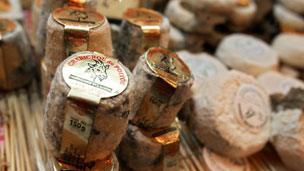Canada worries about US-EU free trade
- Published

The European Union and the US announced this month that they will soon begin talks on the biggest free-trade deal in history. This news was not greeted with joy in Canada, which launched its own, so far inconclusive, trade talks with the EU some four years ago.
There are essentially two kinds of ice skates.
Hockey skates have a long, smooth blade along the bottom. Figure skates have serrated picks at the toe. If you learn how to skate in one kind, it's actually quite difficult to adapt to the other.
But I did not know this until recently.
I was sent to cover an anti-free-trade protest that was scheduled to take place on Ottawa's frozen canal.
The press release said the group, the Council of Canadians, wanted to "put Ceta on ice" - Ceta being the planned Comprehensive Economic and Trade Agreement with the European Union.
The EU delegation was in town negotiating, so the protesters vowed to skate down the Rideau Canal with banners and lights, and if they were stopped and told to leave the 8km (five-mile) skateway, they said they had other plans to draw attention to their cause.
So I borrowed another reporter's hockey skates that she keeps stuffed under her desk for just this kind of Canadian situation.
I wanted to be able to keep up with the crowd of protesters and did not know how far down the canal they would get until the authorities stopped them - or what would actually happen if they did.
Ceta is the biggest bilateral trade deal that Canada has negotiated since the Canada-US Free Trade Agreement in 1988.
Back then, there were vociferous protests across the country. The 1988 election was fought entirely on this one issue.
On campus, in cafes, all we talked about was free trade. The writer Margaret Atwood said the deal would "kill Canada", and other public intellectuals lamented it would turn us all into Americans.
How would Canada - the argument went - with a 10th of America's population, possibly be able to compete in an open market? Our water, our healthcare system, our national identity, would all wash away south.
But when I laced up my skates and got on to the canal with my microphone in my hand, I was shocked.
Firstly, because I was totally unable to skate. In my colleague's borrowed hockey skates I was wobbling and floundering like I had never been on the ice before. I was at risk of falling flat on my face in the middle of an interview.

What effect might European cheese have on Canada's dairy industry?
The next surprise, though, was that I could not find the crowd of protesters. Where was the angry mob? The people shouting about job losses and their sovereignty?
I managed to locate them - seven cold but cheerful evangelists - who skated back and forth a few times while chanting, "Put Ceta on ice!" And then called it a night.
Canada may be on the brink of a massive trade agreement with Europe that some feel could have negative repercussions for the country.
Health costs could rise because the Europeans are looking for an extension on pharmaceutical patents - meaning Canadians couldn't access cheaper generic drugs.
An influx of European cheese could destabilise the heavily-protected dairy industry here.
And city councils would no longer be able to prefer local firms over international bidders. But, unlike 25 years ago, most Canadians don't seem worried.
Maybe the hyperbole surrounding the last free-trade negotiation has made Canadians wary of believing the hype now. Because, of course, free trade with the US did not kill Canada.
It did not take away our healthcare or water, or stop Canadian writers from telling Canadian stories.
The protesters in the 1980s were wrong, but in some ways they were also right.
After the agreement came into force, Canada was thrown into a recession, partly because of free trade. Two hundred thousand manufacturing jobs were lost in the first two years.
And while trade with the US has more than tripled, some analysts still think the deal didn't encourage Canadian companies to become more productive, or to invest in research and development the way it was predicted they would.
Still, some say free trade made Canada what it is now - confident. Laura Dawson is an expert on Canada-US trade who believes that companies like Blackberry and the trendy sportswear designer LuluLemon were allowed to flourish and take on the world because of free trade.
But now she is worried about the Americans again. "The US sucks all the oxygen out of the room," she sighs.
Trade negotiations with both Korea and Central America failed when Canada's would-be partners noticed the big guy from next door walk on to the dance floor.
Laura thinks the fact that Europe is batting its eyelashes at the US spells trouble for Canada. And Nafta's (North America Free Trade Agreement) chief negotiator agrees with her.
John Weekes told me that these days, bilateral negotiations are a competitive game - the first one in gets the best deal.
So, in one respect, Canada's attitude to free trade is exactly the same as it was in the 1980s - no longer quite so protectionist. In fact we are openly ambitious - but we still worry about how to compete against the United States.
In the meantime, Ceta negotiators haven't come to an agreement yet and so the talks will continue to wobble along - as if on hockey skates, trying not to fall flat on their face.
How to listen to From Our Own Correspondent, external:
BBC Radio 4: Saturdays at 11:30 and some Thursdays at 11:00
Listen online or download the podcast.
BBC World Service: Short editions Monday-Friday - see World Service programme schedule.
You can follow the Magazine on Twitter, external and on Facebook, external